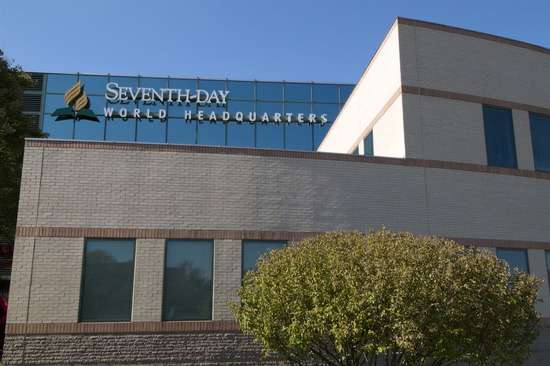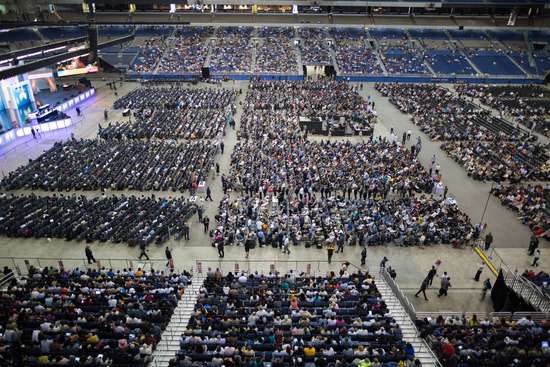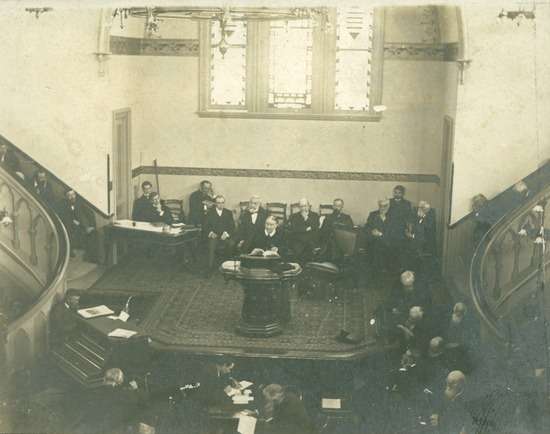The Seventh-day Adventist Church is a worldwide nonprofit Christian organization. So, to keep things running smoothly, maintain cohesiveness in mission, and prayerfully discuss current issues, the General Conference (GC) of Seventh-day Adventists holds a “General Conference Session” every five years. It is a 10-day business meeting, along with various prayer meetings and Bible study sessions. Delegates from around the world discuss and vote on major decisions for the church as a whole and set goals for the next few years. The next GC Session is in 2025.
Though a business meeting, anyone (official church member or not) can attend the activities and watch the presentations. This makes the GC Session one of reconnection, fellowship, learning, and spiritual enrichment.
Let’s go over the basics of what’s involved and how it all works:
- General Conference session framework and procedure
- GS session 2025
- GC session history
- Why the GC session is important
We’ll start with an overview.
General Conference session framework and procedure
The General Conference Sessions are quinquennial business meetings, similar to what many large organizations or governmental entities do to stay engaged with their constituencies. Leaders, workers, and members come together to discuss current events, issues, and policies, and elect the next term’s leadership.
The Adventist Church’s General Conference has its headquarters in Silver Spring, Maryland. This administrative office coordinates ministries, mission efforts, and other operations within the world church.
It’s also the location of the Biblical Research Institute, which continually studies Scripture and keeps the proceedings of the denomination aligned with biblical principles. Elected officials serve as this office’s leadership.
Delegates are elected from each region of the world to represent their constituencies at the GC session. Generally, delegates tend to be local church officers, pastors, teachers, employees of ministry organizations, or others who have demonstrated consistent service, involvement, and understanding of the discussion points relevant to the current Session.
The number of delegates elected from each region depends on criteria such as population, membership, ministry and mission activities, and other relevant factors. Then, along with the GC directors, church administrative officers, ministry leaders, and so forth, discuss the issues of that session and vote on the outcome.
The items being voted on can include nominating the president, amendments to the church’s constitution, potential changes to the church manual, and goals for the church in the next five years.
To be clear, though, GC Sessions are open to any who wish to participate and see how decisions are made and so forth. You don’t have to be a delegate. Usually, tens of thousands of people attend the event. During the actual business meetings, however, only delegates and those with special invitations are allowed to present to the delegates, and only delegates can vote.1
Besides voting, the business sessions also include administrative reports from the different regions of the world church. These reports may include membership updates, reports on special evangelism efforts, informing the church of specific needs or challenges in certain areas, etc.
In addition to the official business meetings, GC Session also includes ancillary meetings, or supplementary, secondary meetings. Unlike business sessions, ancillary meetings focus on the social and spiritual aspects of a GC Session. They’re also tailored for the laity and other attendees who are not delegates, such as other church employees or local church leaders, exhibitors, session volunteers, or family members of the delegates.
Ancillary meetings might include:
- Ministry training sessions
- Topical seminars
- Musical programs
- Group-based ministry activities or sessions, such as women’s and men’s ministries, family ministries, youth ministries, and more.
- Worship meetings
- Prayer rooms2
And besides all these events and meetings, attendees also can enjoy browsing through the large exhibit hall. Here, various ministries and church organizations showcase their ministry projects and services, hand out samples or freebies, and network with one another.
So with all these things to do, a typical day at GC Session might begin with a morning worship session. This allows everyone to get into a spiritually-focused mindset for the day, praise God, and ask the Holy Spirit to guide all the official proceedings and ministry activities.
The first business session occupies the delegates for the remainder of the morning, then breaks for lunch. Another business session runs through the afternoon.
In the evening, the atmosphere shifts from business to reflection, appreciation, and enjoyment. Different regions of the world will present mission spotlights, share stories, and near the end of the event, showcase interesting things from their cultures and traditions during what’s called the “Parade of Nations.”3
For those who can’t attend in person, GC Session is typically livestreamed and covered by the Adventist News Network (ANN) and the Adventist Review.
Next GC session— Summer 2025, St. Louis, United States
GC Sessions are to be held every five years. The next one will take place from July 3-12, 2025 in St. Louis, Missouri. It will be the 62nd GC Session in the Adventist Church.
Because so many delegates now represent all the regions of the church, today’s GC Sessions are commonly held in baseball or football stadiums or convention centers in order to accommodate everyone. The Sessions of 2025 will be held at America’s Center Convention Complex.4
The one recent exception to the 5-year schedule was the GC Session of 2022. Due to world health concerns around that time, this event was shorter and was a hybrid of in-person and virtual events. The upcoming 2025 session, however, will be held entirely in-person, though select meetings will be available to view over livestream, as before.5
The theme for this Session is “Jesus Is Coming, I Will Go!” Ted Wilson, current president of the General Conference, remarks:
“[The theme] reminds us of our wonderful hope in the soon coming of our Savior and the importance of answering God’s call to go wherever He may lead to reach the world for Him.”6
Many have already made plans to attend 2025’s GC Session.
Next, let’s look at what GC Session has been like throughout the denomination’s history.
GC session history
 The first General Conference Session was held May 20, 1863 in Battle Creek, Michigan. At this point, the church was beginning the process of becoming organized. A few Adventists, mainly from the northeast and midwest United States, met in a small wooden church, drafted a constitution, elected a president, and established themselves as a Protestant Christian denomination.7
The first General Conference Session was held May 20, 1863 in Battle Creek, Michigan. At this point, the church was beginning the process of becoming organized. A few Adventists, mainly from the northeast and midwest United States, met in a small wooden church, drafted a constitution, elected a president, and established themselves as a Protestant Christian denomination.7
At first, GC Sessions were held every year in order to discuss and decide on important issues. But as time passed and the church grew, the time between sessions grew longer. In 1970 it was decided to hold these larger business meetings every 5 years.
Some GC Sessions are more well-known than others. For example, the 1888 GC session helped steer Adventists back to some important doctrinal points about salvation by faith,8 and the development of what eventually became the church’s doctrine about the Trinity.9
Why the GC Session is important
When a religious organization becomes a global entity made up of a wide variety of regions, cultures, personalities, methods, needs, and opportunities, a unifying event is needed every few years to help keep things on track.
- It’s a time to make major decisions. As the governing body of the entire worldwide church, the responsibility at this level is to guide discussion and decisions related to doctrine, organization, evangelistic efforts, and other issues that affect how the church runs from the administrative level to the local churches all over the world.
- It’s a time to reconnect. Delegates gather from around the world to engage with one another and learn about the joys and the challenges everyone is facing in their regions. It’s an opportunity to learn about other cultures, as well as different ministry methods and approaches.
- It’s a time to refocus. With representatives from the worldwide church coming together, delegates can stay in touch with what’s happening in other places and tap into a broader perspective. It’s an opportunity to set goals together that can not only lend assistance to where it’s needed, but improve the church as a whole.
From the beginning of the Adventist Church, the General Conference Session has been one of the most important aspects of church structure.
It keeps the church making decisions that represent church members in all locations, showcase cultural and spiritual insights, and keep the church unified in mission.
This five-year tradition was born from a need to keep the church focused on the most important motivator we have—and the very reason we exist as a denomination: to spread the wonderful news of Jesus Christ’s love and of His soon return.
Want to learn more about what it’s like to lead a church?
Important GC Session 2025 information:
When: July 3-12, 2025
Where: America’s Center Convention Complex
St. Louis, Missouri, United States
Theme: Jesus Is Coming, I Will Go!
Website: https://www.gcsession.org/
Notable GC Sessions in Adventist History:
1863: General Conference of Seventh-day Adventists organized, and the denomination is made official.
1888: Helping refocus and uphold the role of salvation by faith
1901: Significant reorganization, which included creating departments
1909: The last GC Session Ellen White attended
1980: 27 Fundamental Beliefs established
2005: 28th Fundamental Belief added
Related Articles
- “Frequently Asked Questions about the General Conference Session,” General Conference of Seventh-day Adventists. [↵]
- Ashworth, Rachel. “62nd General Conference Sessions set for July 3-12, 2025,” Adventist News Network, August 28, 2022. [↵]
- “Frequently Asked Questions about the General Conference Session.” [↵]
- “President’s Welcome,” General Conference of Seventh-day Adventists. [↵]
- Ibid. [↵]
- Ibid. [↵]
- “The History of the General Conference in Session,” General Conference of Seventh-day Adventists, [↵]
- “The 1888 General Conference Session,” Lineage Journey. [↵]
- Burt, Merlin D. “The Trinity in Seventh-day Adventist History,” Ministry Magazine, 2009. [↵]
More Answers
Do Seventh-Day Adventists Have “Rules” For Clothing?
Many religions have guidelines on dress, but what about the Adventist Church? Discover how Adventists choose to dress based on biblical principles.
11 Reasons People Become Seventh-day Adventists
Curious why many people become Adventists? Here are elements of Adventist beliefs, values, and mission often reflected in people’s decisions to join.
How Adventists View the End of the World
The end of the world is no fun to think about. But here’s how we can actually find hope and comfort in what’s to come.
What Is an Adventist Medical Missionary?
A medical missionary in the Adventist Church is someone who cares for the medical needs of people as a way of showing the love of Jesus. They may travel to another country, or even just serve in their hometown.
Is the Seventh-day Adventist Church Protestant?
Learn how the beliefs of the Seventh-day Adventist Church align with the “5 solas” of Protestantism.
Are Seventh-day Adventists Evangelicals?
According to its origins and definition, evangelicalism is about following Jesus and the Bible and sharing the Gospel through the way we live our lives. Adventists wholeheartedly harmonize with these principles.
Could Anything Keep Me from Becoming an Adventist?
We are each saved through Christ. But when it comes to church membership, are there certain beliefs or expectations to become an Adventist?
Do Seventh-day Adventists Have “Rules”?
We uphold principles we believe will help us maintain a closer relationship with Jesus and His Word. Learn how these principles guide Adventist lifestyles.
Do Seventh-day Adventists Have “Rules” For Marriage?
Around the world, many cultures and religions have various marriage traditions, expectations, or even rules when it comes to choosing a partner, planning the wedding, extended family logistics, or a number of other things.
Can a Seventh-day Adventist Marry a Non-Adventist?
Yes. Seventh-day Adventists are not under any official rules that dictate who they can or cannot marry. This is a personal, life-altering decision between the couple and God.
What Adventists Believe About Alcohol and Tobacco Use
The Seventh-day Adventist Church has historically discouraged the use of alcohol and tobacco. Even before the church started in 1863, its leaders were realizing the negative effects of these substances.
Jewelry—Why Do Many Seventh-day Adventists Choose Not to Wear It?
If you walk into a Seventh-day Adventist church service, you might notice that many people aren’t wearing earrings, bracelets, necklaces, or sometimes even wedding rings.
International Pathfinder Camporee
Youth aged 10-15 in the Adventist Church’s global Pathfinder program look forward to the International Camporee every 5 years. This event brings together Pathfinders from around the world for exciting activities.
How Adventists interpret Bible prophecy
Bible prophecy conjures up a variety of emotions in people. For some, it feels exciting or mysterious.
Moviegoers’ Guide to The Hopeful: The Facts Behind the Film
Learn where and when you can watch The Hopeful and how to get tickets. Already seen it? We’ll uncover the real story that inspired this film.
How Are Seventh-day Adventists Different from Other Protestants?
As a Protestant Christian denomination, the Seventh-day Adventist Church regards the Bible as the ultimate guide and looks to Jesus Christ as the only way to salvation. We do have some differences of belief or interpretation when it comes to topics like Bible prophecy, end-time events, the Sabbath, and a person’s state after death.
How Adventists Handle Death and Funerals
Most Seventh-day Adventist funeral services are similar to those of other Protestant denominations, such as Methodists, Baptists, or Presbyterians, but you might find a few differences or unique nuances.
Adventist Culture
Many Seventh-day Adventists adhere to specific lifestyle principles that can make them stand out from those in other Christian denominations. Whether it’s going to church services on Saturday or eating the popular Adventist entrée of “haystacks.”
Do Adventists Observe Easter-Related Holidays?
Jesus Christ’s resurrection, celebrated on many Easter-related holidays, is central to the beliefs of the Seventh-day Adventist Church. And that means we seek every opportunity to remember it.
An Overview of Seventh-day Adventist Higher Education
The Seventh-day Adventist Church has about 118 tertiary schools around the world. Though many of them are within North America, you’ll also find Adventist universities in countries across the world—places like Croatia, Austria, Brazil, Madagascar, and the Philippines.
The Ten Commandments from a Seventh-day Adventist Perspective
Ever eaten a salad and gotten a big piece of green stuck in your teeth? And you didn’t realize it was there until you looked in the mirror? (Because no one ever told you!)
The Benefits of A Seventh-day Adventist Academy
Adventist academies are high schools (grades 9-12) that are owned and operated by the Seventh-day Adventist Church.
Are Seventh-day Adventists Christians?
Yes, the Seventh-day Adventist Church is a Protestant Christian denomination formed in 1863. Just like other Christians, we believe that Jesus Christ is our Savior and seek to follow the principles of the Word of God.
Adventist Movies: Where Faith and Film Meet
The Adventist Church uses film to share our faith and uplift positive values. Learn more about specific Adventist-produced films and where to find them.
Do Adventists Celebrate Christmas?
In general, most Seventh-day Adventists do celebrate Christmas.
Since our denomination doesn’t have specific guidelines about holidays, it’s up to each member to decide whether to celebrate it based on their personal convictions and study of the Bible.
What Does the Bible Say About Modesty
Seventh-day Adventists and Christians in general try to ensure their outward presentation and lifestyle glorify God. This often involves daily habits like the ways we hold conversations, the ways we dress and accessorize, and the ways we regard other people when we’re out and about.
How Do Adventists Make Movie and Music Choices?
How do Adventists decide what music to listen to and which movies to watch? Learn how Bible principles can help us make better entertainment choices.
Does the Seventh-day Adventist Church Believe in Paying Tithe?
Seventh-day Adventists believe in paying tithe and offerings based on the biblical command and our commitment to being wise stewards of God’s resources. These donations help fund the mission of the Adventist Church by supporting pastors, missionaries, church expenses, and evangelistic projects, among other things.
Seventh-day Adventist World Population and Demographics
The Adventist Church has more than 22 million members and 100,000 churches worldwide, plus a large system of hospitals, schools, and publishing houses. Learn more about this diverse church.
Didn’t find your answer? Ask us!
We understand your concern of having questions but not knowing who to ask—we’ve felt it ourselves. When you’re ready to learn more about Adventists, send us a question! We know a thing or two about Adventists.































